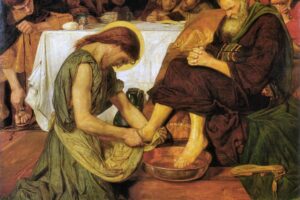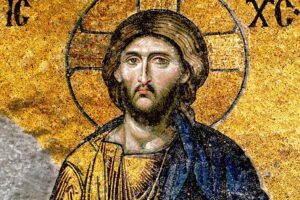Last edited on 25/Jan/2021
The Bible’s Answer
Introduction
The reason why we need Jesus is because of who he is in comparison to who we are. Jesus is holy and righteous. We, on the other hand, are not. The reason why we aren’t holy and righteous is because unlike Jesus, we have all sinned (Romans 3:23). To sin means to violate God’s commandments which he gave us to live by, whether by thought, word, or deed, and to fail to do good when we could or should have (1 John 3:4; James 4:17). The result of sinning is separating oneself from a relationship with God (Isaiah 59:2). This is because God is holy and righteous (Leviticus 11:44), and no evil whatsoever can dwell in his presence, or in his heavenly Kingdom (Revelation 21:27). And because God’s Kingdom is eternal, this means eternally separating ourselves from him (2 Peter 1:11). Hell is the place of eternal suffering and separation from God (Matthew 25:41, 46).
All People Have Sinned
So, what if you haven’t sinned? If you haven’t sinned, then it means that when Jesus comes again to righteously judge the living and the dead according to our thoughts, words, and deeds on earth, then you will be judged as righteous before God, and you will inherit eternal life, because you followed God faithfully and blamelessly. So, how do you know if you’ve sinned or not? Well, let’s look at some of God’s commandments. Have you ever murdered, stolen, committed adultery, lied, defrauded, or dishonoured your parents (Mark 10:19)? Have you ever cursed God’s name (Exodus 20:7)? Have you ever coveted your neighbour’s spouse or property (Exodus 20:17)? Have you failed to love God with all your heart, soul, mind, and strength (Deuteronomy 6:5)? And have you failed to love your neighbour as yourself (Leviticus 19:18, 34)? If so, then you’ve sinned. Or have you ever been unjustly angry with someone or insulted them? If so, then you’ve committed murder in your heart (Matthew 5:21–22). And have you ever looked at someone with lustful intent? If so, then you’ve committed adultery with them in your heart (Matthew 5:27–28). Jesus said: “You therefore must be perfect, as your heavenly Father is perfect.” (Matthew 5:48, ESVUK) Perfection, therefore, is God’s standard. Do you fit this standard?
For those who of you who believe you do fit this standard, the Bible says: “If we say we have no sin, we deceive ourselves, and the truth is not in us … 10 If we say we have not sinned, we make him a liar, and his word is not in us.” (1 John 1:8, 10) In other words, if you believe you fit God’s perfect standard, then not only are you dishonest with yourself, but his truth is not in you, and you’ve made God out to be a liar. For those of you who are honest, and realise that you don’t fit this standard, it means that you’ve fallen short of God’s glory, and will be eternally separated from him in Hell. Romans 3:23 says “for all have sinned and fall short of the glory of God.” All means all, with no exceptions. By sinning, we’ve rebelled against God, and allied ourselves with the desires of our flesh, rather than God. By sinning, we’ve said that we don’t need God, abandoned him, and gone our own way. By our selfishness, instead of living in content with God’s blessings, we’ve chosen that it’s not enough, and pursued worldly things. Instead of thanking and giving God the glory for creating and sustaining us, we give all the credit to the false idols of this world, whether they be materialistic or man-made theories and ideas. Like a marriage partner who betrays and leaves their spouse for no good reason, we have left God in the same way. Because of our sin, we hurt not only God, but our neighbours, friends, and loved ones too. We have all sinned, and deserve God’s eternal punishment. We deserve God’s righteous and holy judgement. Our sin has broken us. We are dead in our sins (Ephesians 2:1).
Jesus Came to the Earth to Save Us
But not all hope is lost. Despite all this, God never gave up on us. And this is where the gospel comes in. The gospel—translated as “the good news” from the biblical Greek—is the historical event recording the death, burial, and resurrection of Jesus (1 Corinthians 15:1–4). It is the single most important event in history. The gospel is the power of God’s salvation to everyone who believes, and in it, God’s righteousness is revealed (Romans 1:16–17). The gospel shows us that God freely gives us his grace through Jesus Christ (Romans 5:15–16). Although we’ve all failed to live up to God’s perfect standards, Jesus did not. Jesus lived a holy, righteous, and sinless life. 1 Peter 2:22–23 says that Jesus “committed no sin, neither was deceit found in his mouth. 23 When he was reviled, he did not revile in return; when he suffered, he did not threaten, but continued entrusting himself to him who judges justly.” Jesus sums up his life mission by the statement: “If anyone hears my words and does not keep them, I do not judge him; for I did not come to judge the world but to save the world.” (John 12:47) Above all, Jesus came to save us. He came to save us by dying for us, as he said in Mark 10:45: “For even the Son of Man came not to be served but to serve, and to give his life as a ransom for many.” Jesus lived a perfect life not for himself, but for us. He did this because we failed to live it. Jesus said “Do not think that I have come to abolish the Law or the Prophets; I have not come to abolish them but to fulfil them.” (Matthew 5:17)
Jesus’ Life Was Our Ultimate Sacrifice
In the times before Jesus’ death, God commanded the Israelites to bring animal sacrifices and other offerings to the priests in his temple, who would offer them to him on the altar, as a means of them expressing their sorrow to God for sinning against him, and this represented the forgiveness of sins, and also fulfilled the requirements of their covenant with God. Animals were used to emphasise the severity of sin. But because these offerings weren’t perfect, they had to repeat this process on set times given by God. This was a foreshadowing of the coming of Jesus, who would, as the Messiah (the promised Saviour of the world, see John 4:25–26) and Son of God (meaning that Jesus is equal with God, see John 5:18), offer himself, his own body, as the perfect, once and for all sacrifice for our sins. He offered himself by being crucified on a Roman cross, after fulfilling the law of God for us which we failed to do.
But when Christ appeared as a high priest of the good things that have come, then through the greater and more perfect tent (not made with hands, that is, not of this creation) 12 he entered once for all into the holy places, not by means of the blood of goats and calves but by means of his own blood, thus securing an eternal redemption. 13 For if the blood of goats and bulls, and the sprinkling of defiled persons with the ashes of a heifer, sanctify for the purification of the flesh, 14 how much more will the blood of Christ, who through the eternal Spirit offered himself without blemish to God, purify our conscience from dead works to serve the living God. (Hebrews 9:11–14)
Because of our sin, we have a legal debt against God which we have to pay. But because God’s standard is perfection (Matthew 5:48), and because no sin can enter his presence or kingdom (Revelation 21:27), we cannot pay this debt. No amount of good works that we do can fulfil it (Romans 3:28). But by living the perfect life for us, and sacrificing himself on the cross, Jesus paid this debt for us: “And you, who were dead in your trespasses and the uncircumcision of your flesh, God made alive together with him, having forgiven us all our trespasses, 14 by cancelling the record of debt that stood against us with its legal demands. This he set aside, nailing it to the cross.” (Colossians 2:13–14). When Jesus suffered and died on the cross, he took all of our sins upon his own body: “He himself bore our sins in his body on the tree, that we might die to sin and live to righteousness. By his wounds you have been healed.” (1 Peter 2:24) Jesus didn’t just die a horrible and painful death as an innocent man, but he died as our substitute. In other words, we should have suffered and died the death Jesus died (Isaiah 53:4). He did not deserve to suffer and die; we deserved that. Yet Jesus still chose to die for us voluntarily. He said “For this reason the Father loves me, because I lay down my life that I may take it up again. 18 No one takes it from me, but I lay it down of my own accord. I have authority to lay it down, and I have authority to take it up again. This charge I have received from my Father.” (John 10:17–18)
Jesus Rose Again
On the third day after Jesus’ death, he rose again from the dead, confirming to his disciples with physical evidence that he really was who he said he was: the Son of God and Saviour of the world (Matthew 16:16–17; Mark 14:61–62). Jesus said that all this was prophesied about him in the Old Testament “Thus it is written, that the Christ should suffer and on the third day rise from the dead, 47 and that repentance and forgiveness of sins should be proclaimed in his name to all nations, beginning from Jerusalem.” (Luke 24:46–47) By dying for us, Jesus saves us. He saves us from our sins. He saves us from the righteous wrath of God (Romans 5:9). Jesus’ perfect sacrifice atones for the sins of the whole world (1 John 2:2), once and for all (Hebrews 10:10). Because of him, we can be forgiven all our sins, be declared righteous before God, and have eternal life (John 3:16). It is only through Jesus that we can be reconciled with God (Romans 5:10–11; 2 Corinthians 5:18). All these wonderful blessings are given to us by grace alone (Ephesians 2:8) through faith alone in Jesus Christ alone:
We ourselves are Jews by birth and not Gentile sinners; 16 yet we know that a person is not justified by works of the law but through faith in Jesus Christ, so we also have believed in Christ Jesus, in order to be justified by faith in Christ and not by works of the law, because by works of the law no one will be justified. (Galatians 2:15–16)
Jesus Is the Incarnation of God
Ultimately, the most incredible part of what the gospel tells us is about what God himself did to save us; the love that God showed us by his own actions. Jesus is God in flesh (John 1:1, 14; Colossians 2:9); He is fully man and fully God. God came to humanity as Jesus, and God suffered and died for us as Jesus, because only God could save humanity from their sins. The only one who could please an infinitely holy and righteous God was God himself, and so Jesus Christ did this, as God in flesh. Jesus’ love for us is beyond measure (Ephesians 3:19). God is love (1 John 4:8), and Jesus did the greatest act of love for us, by dying for us all (John 15:13), even for the people who handed him over to death, and inflicted severe pain on him (Luke 23:34). He didn’t just forgive you. He paid the full punishment and fulfilled all the righteous requirements for you. He not only showed you love, but at the same time he fulfilled all standards of justice. Thus Jesus is not only a God of love, but he is also a God of justice.
So why, then, did Jesus refer to God as his Father? Jesus refers to God as his Father because God exists as a Trinity, which means that there is only one God (Deuteronomy 6:4; Isaiah 45:5) in three Persons: the Father, Son (Jesus), and Holy Spirit. While the Father is not the Son, and the Son is not the Spirit, and the Spirit is not the Father, each of them is God (1 Corinthians 1:3; Hebrews 1:8; Acts 5:3–4). Thus, Jesus is God, and he is also one with God (John 10:30); in other words, he is God the Son (but he is not God the Father or God the Holy Spirit). Each member of the Godhead is equally, fully, and simultaneously God. They are united in the one divine nature and being.
No One Is Beyond God’s Forgiveness
We are all sinners, and we need Jesus for the salvation that he offers. If we reject what Jesus has done for us on the cross, and his resurrection, then we will go to Hell. He will come again to judge all of us according to our thoughts, words, and deeds (Matthew 25:31–46; 2 Corinthians 5:10). If you want to be saved, then you need to accept that you are a sinner and that you deserve God’s eternal punishment. You need to realise the evil within your own heart which makes you corrupt and undeserving of God’s grace and love. Once you realise this and are sorry, pray to Jesus for forgiveness. He allows you to do this, as he said in John 14:14: “If you ask me for anything in my name, I will do it.” Put all your trust in him. Cast all your cares and concerns on him. If you are truly sorry, and confess to him and ask him for forgiveness, he will forgive you: “If we confess our sins, he is faithful and just to forgive us our sins and to cleanse us from all unrighteousness.” (1 John 1:9)
If you’re worried that you’ve sinned too much to be forgiven, don’t be. There is no sin too great for Jesus to withhold forgiveness. Jesus does not look at who you once were, but at who you are now. The Bible assures us of this, when Paul, a man who was once “a blasphemer, persecutor, and insolent opponent”, declares that although he was the worst of sinners, he was still forgiven: “The saying is trustworthy and deserving of full acceptance, that Christ Jesus came into the world to save sinners, of whom I am the foremost. 16 But I received mercy for this reason, that in me, as the foremost, Jesus Christ might display his perfect patience as an example to those who were to believe in him for eternal life.” (1 Timothy 1:15–16) Jesus said that he came “to seek and to save the lost” (Luke 19:10), and if you haven’t yet accepted Jesus, you are “the lost” that he’s seeking. He invites you, no matter who you are, to come to him, and assures you that you will find rest for your soul in him: “Come to me, all who labour and are heavy laden, and I will give you rest. 29 Take my yoke upon you, and learn from me, for I am gentle and lowly in heart, and you will find rest for your souls. 30 For my yoke is easy, and my burden is light.” (Matthew 11:28–30)
Belief in the Biblical Jesus Is Necessary
It should also be mentioned that it is necessary to put your faith in the Jesus of the Bible alone (God in flesh), and not another Jesus, such as the Jesus of Mormonism (the literal spirit offspring of God the Father and his Goddess wife), or the Jesus of the Jehovah’s Witnesses (a created archangel, Michael, who became a man and who only started reigning as king in 1914), etc. This is because the Jesus of the Bible is the only true Jesus, God in flesh, who alone is capable of saving you. “Jesus said to him, “I am the way, and the truth, and the life. No one comes to the Father except through me.” (John 14:6) Only the Jesus of the Bible’s sacrifice was sufficient to cover all your sins, without you having to add any work to it (Galatians 2:21).
Conclusion
If you believe in the saving grace of Jesus, that he is your Lord and Saviour (Romans 10:9–10) who died for your sins on the cross, and that he rose again from the dead, then you are saved. Jesus said: “Truly, truly, I say to you, whoever hears my word and believes him who sent me has eternal life. He does not come into judgement, but has passed from death to life.” (John 5:24) He also said: “I am the resurrection and the life. Whoever believes in me, though he die, yet shall he live, 26 and everyone who lives and believes in me shall never die.” (John 11:25–26) He promises you these things if you believe in him. There is no other way to escape from our just eternal condemnation but through Jesus (Acts 4:12). If you would like to accept Jesus into your life now, you may say the following prayer, or one similar to this. But please note that saying a prayer isn’t what saves you; it is only if you put your trust and faith in Jesus (Acts 16:31) as a result of God’s grace (John 6:37, 44), that you’re saved:
“Jesus, I accept you as my Lord and Saviour, and I believe that you are the Son of God. I’m sorry for all the wrong things I’ve done. No amount of words can express my sorrow for sinning against you. Please forgive me. Thank you for dying for my sins on the cross, I am eternally grateful to you. I love you, and I dedicate my life to you. I seek to serve and worship you all the days of my life, and forevermore. Take lead of my life, and make me the kind of person you want me to be. Amen.”
The thief comes only in order to steal, kill, and destroy. I have come in order that you might have life—life in all its fullness. — Jesus Christ (John 10:10, GNT)






